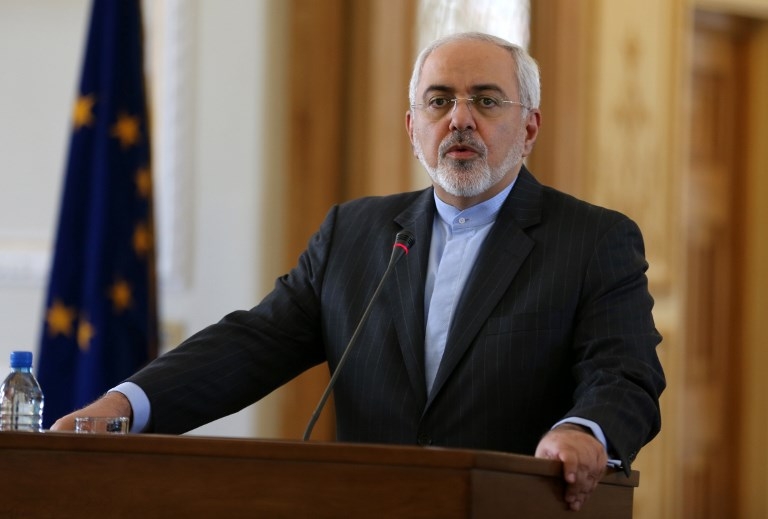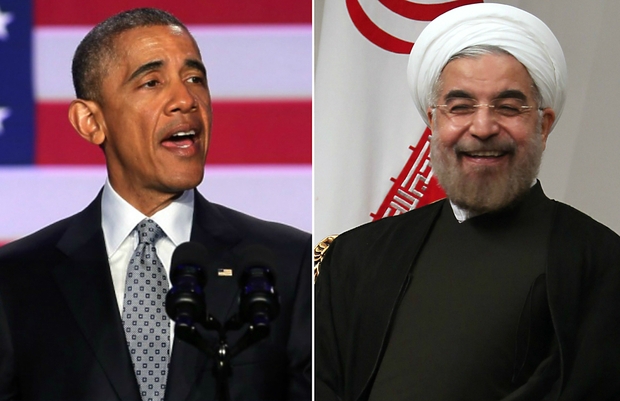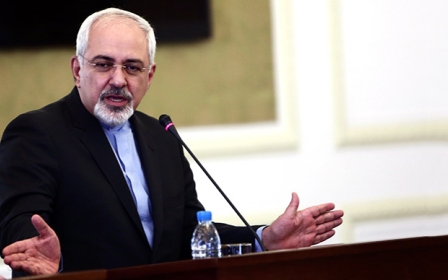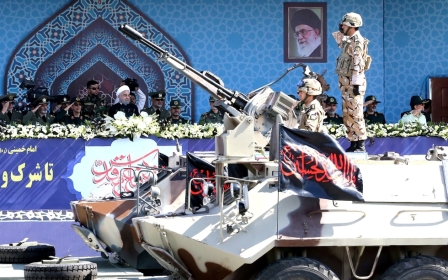EXCLUSIVE: Iranian foreign minister warned that Trump threats would backfire

Two months into the new Trump administration, Iranian Foreign Minister Javad Zarif warned that Washington's behaviour towards the nuclear deal threatened to "render the entire bargain meaningless," according to a copy of a letter obtained by Middle East Eye.
"Iran cannot afford to keep implementing the deal unilaterally while a key participant persists in its systematic violation of key provisions of the JCPOA by invoking irrelevant, extraneous and unfounded excuses," he wrote, referring to the deal, which is formally referred to as the Joint Comprehensive Plan of Action.
Zarif's letter, addressed to European Union foreign policy chief Federica Mogherini, stands in stark contrast to a celebratory letter sent by Hassan Rouhani to US President Barack Obama after the deal was implemented in early 2016 and also revealed by MEE for the first time.
The two trace the breakdown of ties between the two countries with Trump's rise to power and show the dangerous fallout of his confrontational approach towards Iran, ratcheted up again today.
Iran has been accused of violating if not the actual terms of the deal then the spirit of the agreement, by supporting militant groups in the region and developing long-range missile technology.
However, the general consensus among most observers - and the rest of the countries which participated in the P5+1 nuclear agreement - is that the current Iranian leadership posed the best opportunity for a deal that would keep the country nuclear-free.
The two letters also illustrate, say analysts, just how far the Iranian side may have been willing to go diplomatically and how the US had squandered opportunities.
"The change in tone from Rouhani to Zarif's letter demonstrates a proven flexibility in Iran’s position that this administration refuses to acknowledge," said Reza Marashi, research director at the Washington, DC-based National Iranian American Council.
"I always tell people I'm as nice as you let me be and I believe that's Iran's policy towards the United States."
The change in tone from Rouhani to Zarif’s letter demonstrates a proven flexibility in Iran’s position that this administration refuses to acknowledge
- Reza Marashi, National Iranian American Council
"He clearly has a willing partner in Tehran to test the proposition of resolving problems through sustained diplomacy. Now it's going to be really hard to get there after nine months of Trump poisoning the well, publicly and privately."
The letters, which were leaked to MEE in advance of Trump's speech on Friday, fit the descriptions of correspondence which several analysts said they had heard about, but had never seen in full until now.
Rouhani to Obama
In his letter sent to Obama last year after the implementation of the nuclear deal on 16 January, Rouhani says he is "very pleased" that the agreement is coming to fruition.
I believe that the 'win-win' approach which governs the JCPOA can serve as a good model for the resolution of other disputes
- Iranian President Hassan Rouhani in early 2016
The agreement "proved that even the most complex of global issues can be resolved through dialogue, negotiation and constructive engagement," he writes.
"I believe that the 'win-win' approach which governs the JCPOA can serve as a good model for the resolution of other disputes and international and regional crises, especially in the tumultuous Middle East – which is unfortunately slipping deeper into the mire as each day passes."
He ends the two-page letter thanking Obama and expressing his appreciation "in advance for the appropriate instructions coupled with the timely and necessary actions that you will issue and undertake to ensure its full implementation".
"Please accept the assurances of my highest consideration," he wrote.
Model for future deals?
The most striking feature of Rouhani's letter, said Mahan Abedin, an Iranian political analyst and director of Dysart Consulting, is just how hopeful he is that the deal will lead to resolving other issues.
"That lends credence to what some of his internal opponents were saying in 2015 and 2016, especially before Trump came to power," Abedin said.
He noted that they claimed that Rouhani saw the deal as a model for future deals which might see Iran give up its missile technology or support for Hezbollah. "This really does come out in the letter," he said.
Also worth noting, said Abedin, is Rouhani's tone. "It shows he had genuine respect for Obama, and I think it also reflects his confidence in the integrity of the negotiation process," he said.
"He's surveyed the whole thing very closely, he had full confidence in it, and he was really pleased with the outcome and sees it as his baby," Abedin said.
Those letters "were just a long list of complaints with one or two sentences with a small opening," Parsi said.
Rouhani’s letter "is nothing like that. There is not complaint. There is no going back into the history. It's not relitigating the last 50 years ... It tells you how far the US and Iran came under Obama to interact with each other in a normal way."
Zarif to Mogherini
Just 15 months later, Zarif's letter to Mogherini, dated 28 March 2017, accuses the US of violating the nuclear deal and treating it with open hostility that threatens "to render the entire bargain meaningless, unbalanced and unsustainable".
The Obama administration's implementation of the deal may have been "lacklustre," but two months into the new administration, he writes that it is evident that the US government "has maliciously intended – since the very beginning – to prevent normalisation of trade with Iran and to deprive Iran from the economic dividends clearly envisaged in the JCPOA".
Further proposed sanctions against Iran and reviews of sanctions already in place, he says, have created "indefinite uncertainty and fear in the global economic community about the future of economic relations with Iran," which he says are a clear violation of the deal.
"This in fact has significant detrimental consequences," Zarif says, specifically pointing out the difficulties of non-US firms to operate in his country as a result of US policies following the agreement.
"These statements not only disrespect the established principles of international law ... but also contravene the provisions of the JCPOA," he writes, citing the agreement's paragraph 28, which calls on senior officials on all sides to support the implementation "including in their public statements".
"Iran reserves the right to take necessary measures in response to any action or omission which could in effect jeopardise the balance of 'the reciprocal commitments' as enshrined in the JCPOA and adversely affect its 'balanced' implementation," Zarif concludes.
Quick off the mark
The issues raised in the letter are no surprise to those following the nuclear deal closely. What's new, however, is what it reveals about Iran's current strategy.
"In public, they are not going as aggressive on [the violations discussed in the letter], and I don't think it's because they don't think they have a case," Parsi said.
"I suspect that they have decided to play the reasonable party by not making too much noise about Trump's actual violations in public, but instead let Trump shoot himself in the foot."
It also, Abedin and Marashi said, shows just how quickly the Iranians started to work around the assumption that Trump was serious about his campaign threats to attempt to end the deal.
"What this letter tells you is that they anticipated this scenario that's unfolding now and they had made preparations six months before. So Iran will be well-prepared at least diplomatically about what's about to hit them," Abedin said.
"The Iranians figured it out faster than the Europeans did," Marashi said. "I talked to Iranians after Trump's election. Within a month and a half, two months in, they knew what they were dealing with. Only now are we hearing from the Europeans."
Marashi points out, he waited three months before privately conveying his concerns. "That demonstrates a level of restraint predicated on keeping the deal alive," he said.
But given the political dynamics in Iran – including continued financial restrictions - Zarif no longer had the luxury not to take a tougher stance, Abedin said.
"He's making it clear that they weren't happy with the Obama administration either because they were also very slow in easing the sanctions," he said. "What's going to happen now – now that Trump is about the decertify? People need to take strong diplomatic positions."
MEE contacted Zarif and Mogherini's offices for comment, but neither had responded by the time of publication.
This article is available in French on Middle East Eye French edition.
Middle East Eye propose une couverture et une analyse indépendantes et incomparables du Moyen-Orient, de l’Afrique du Nord et d’autres régions du monde. Pour en savoir plus sur la reprise de ce contenu et les frais qui s’appliquent, veuillez remplir ce formulaire [en anglais]. Pour en savoir plus sur MEE, cliquez ici [en anglais].






